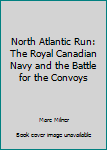North Atlantic Run: The Royal Canadian Navy and the Battle for the Convoys
Select Format
Select Condition 
Book Overview
Book by Milner, Marc This description may be from another edition of this product.
Format:Paperback
Language:English
ISBN:0140121765
ISBN13:9780140121766
Release Date:January 1990
Publisher:Penguin Books Australia Ltd.
Length:1 Pages
Weight:0.70 lbs.
Dimensions:5.1" x 1.1" x 7.8"
Customer Reviews
1 rating
Canadians to the front....
Published by Thriftbooks.com User , 16 years ago
"North Atlantic Run" is a reissue of Marc Milner's seminal 1985 study of the Royal Canadian Navy and the battle to protect Allied convoyes in the North Atlantic during the Second World War. Author Milner addresses the continuing evolution of thought about the Canadian role in a new preface dated 2006. The Royal Canadian Navy (RCN) nearly disappeared in the economies forced by the Great Depression of the 1930's. The arrival of World War II in 1939 found the RCN badly understrength in men, ships, and facilities against any of a variety of conceivable missions. The early onset of German submarine warfare against North Atlantic shipping to Great Britain focused the attention of the British Royal Navy (RN),and by extension the RCN, on convoy duty. As Milner documents in painful detail, the rapid expansion of the RCN repeatedly outran its experienced manpower, shore facilities, and ability to train and properly equip newly commissioned escort vessels. The small size of the RCN at the outbreak of war made some shortages unavoidable. However, the situation also stemmed from the RN's demands for assistance and the RCN's commendable willingness to meet those demands, at the cost of its own operational efficiency. An extreme example early in the war has vessels manned by skeleton RCN crews for transfer to the RN being pressed into immediate service as active combants upon arrival in Britain. The sailors of the RCN did not lack for courage. The RCN executed the bulk of convoy duty in the dark days of 1942, when the German submarines were most effective in the North Atlantic. The continuing and overwhelming demand for seagoing escort seriously interfered with escort ship and group work-up and with the modernization of relatively primitive escort vessels. The RCN Naval Staff did not manage to get on top of the problem before 1943. Consequently, convoys took a beating despite the RCN's best efforts. Convoy losses lead to criticism, probably unfairly, and the withdrawal of the RCN escorts in early 1943 to a less demanding theater of operations. The understandable frustration of RCN personnel over their lack of training and equipment coincided with the decisive defeat of the German Navy in the Battle of the North Atlantic and with fingerpointing within and without the RCN. The Chief of the Canadian Naval Staff was replaced, and the RCN restructured. The mature RCN that finished the war did so in fine fashion, despite a lingering bitterness over the Convoy Battles. "North Atlantic Run" is a superb history of the RCN in the convoy battles, and of its relationships with the RN and the United States Navy. Milner's narrative covers the experience of the convoys, the shore facilities in Newfoundland and Nova Scotia, and the frustration of the RCN Staff over its treatment as a junior partner by its allies. Milner has included a selection of photographs of key personnel and examples of ship types, along with maps and diagrams illustrating the theater





